Performa 475 + Dial-Up Internet
In March 2013, in my review of Apple Macintosh Performa 475, I told Habr's readers about an Apple PC from the mid-90s. However, due to the absence of a network card onboard this old man, the review did not consider the work of Apple Macintosh Performa 475 on the Internet. What was my surprise when I saw the first comment - people were eager to connect Macintosh Performa 475 to the global network!

Even the absence of a network card didn’t bother me — there were many ways to connect Macintosh to the world wide web, including through LocalTalk.
')
Well at least nobody mentioned about Dial-Up ... Although, why not?
I hope you have not forgotten what is necessary to access the Internet using a modem? Right! Modem. And still need an Internet provider that provides access to the world wide web via dial-up connection over the telephone line.
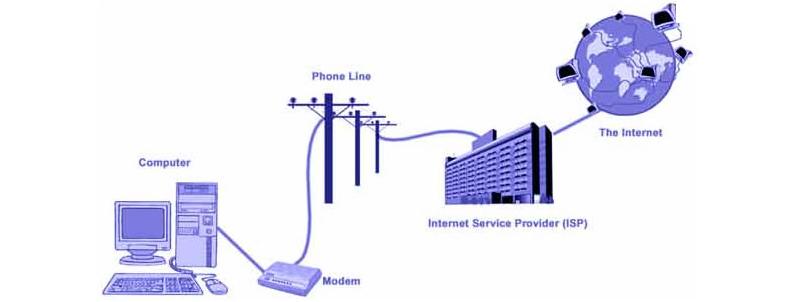
The modem was found quite quickly, but with providers providing access to the Internet via dial-up there was a rather interesting situation. Since there is almost no demand for a dial-up Internet connection via a normal (non-ADSL) modem in major cities, I could not find one suitable provider in Moscow and the region.

It is quite possible that I was looking very badly, and such providers exist, however, it is extremely unprofitable to use their services - in addition to paying for access to the Internet, you will also have to pay telephone bills.
Surely everyone remembers that before there was no hourly billing of telephone calls in the city, and many modem owners occupied the telephone line all night. After all, during the day, households could expect an important call to their home phone (not everyone had mobile phones, especially grandparents), and Internet access in the dark (it seems ROL from 2:00 to 7:00) cost much cheaper.
With the introduction of time-based pricing of telephone calls, the modem Internet began to hit the pocket twice - it was necessary to pay not only access itself, but also telephone bills for hours-long telephone “conversations”.
Yourself provider.
As you know, there must always be at least one way out of any situation. So in our case, you can opt out of the services of outside organizations and play the provider yourself. We just need to raise and configure the Dial-In server (inbound server), and the easiest way to do this is in the Windows operating systems.

To establish a modem connection and provide access to the Internet, you can use the built-in tools of the Windows operating system (starting with Win2K and higher) using the wizard to create a new connection on the server computer. Working with the wizard is simple and straightforward, however, just in case, I’ll give a small instruction in pictures, applicable for Windows XP.
It should be noted that the use of telephone modems implies the existence of a telephone line with all the ensuing consequences. For example, it is desirable to have a PBX to establish communication between two modems. It is desirable, but not necessary. There are several ways to do without it:

Null modem connection.
I didn’t like the simplicity of using a null modem cable. In addition, you can inadvertently burn the COM port and / or the computer itself, because the null-modem connection does not have a galvanic isolation - if you have an old Soviet electrical wiring without grounding, a sudden might happen.

Modem connection on a dedicated line.
Using a dedicated line is the second easiest way to establish a dial-up modem connection without PBX. Unfortunately, home modems do not know how to work on a dedicated line. This prerogative is only expensive professional modems, which I, alas, did not have.
Quite a good option is to use ordinary modems for connection, "emulating" the presence of PBX. I would choose this method if I had absolutely accidentally missed the NEC (Nitsuko) 2464 TX office PBX, which I will use in my experiments.
Macintosh and COM ports.
Another surprise awaits us when connecting a modem to the Apple Macintosh Performa 475, the serial port of which is designed in the form of a MiniDIN-8 connector . To connect the modem, we need an adapter, the scheme of which is given below.
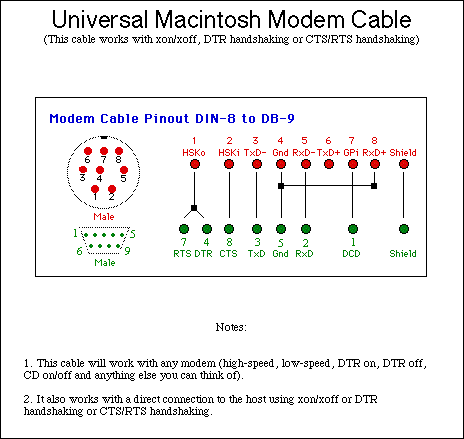
The main difficulty in the manufacture of the adapter lies in the search for the Mini-DIN-8 (Male) connector. In the store of radio parts, known for its high prices, the name of which I will not voice, it is proposed to buy these connectors for 140 rubles.
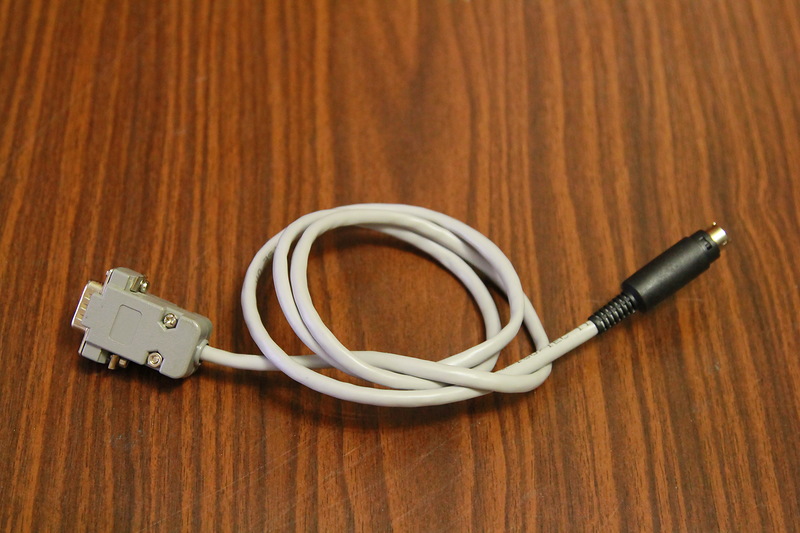
The result should be something like this.
Modem selection.
MacOS 8.1 supports some models of modems out of the box, but you can only find these modems in the museum. The only exception is probably the US Robotics modems, which can still be found on the entresol of our vast country.
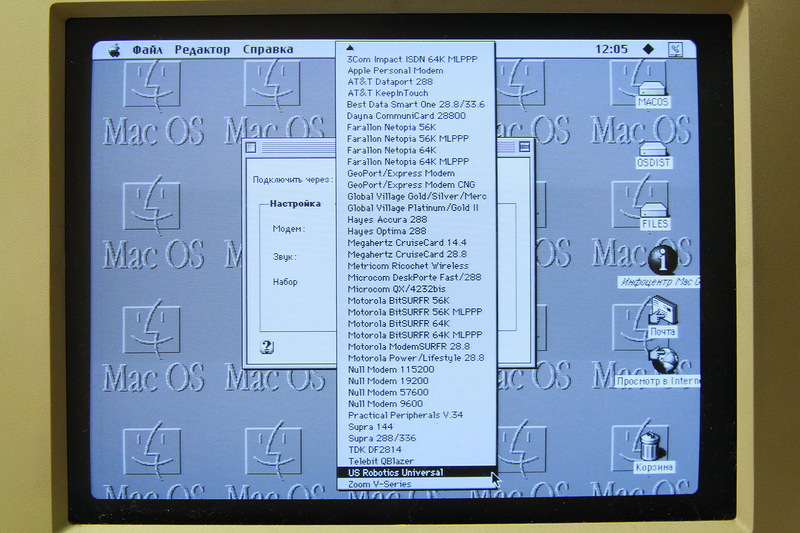
If you have a modem from this manufacturer, you can select the appropriate driver from the list of supported modems.
Unfortunately, after I got three Zyxel Omni 56K modems (PRO, Plus and PCI Plus), all the other modems I had safely went to landfill, including the external Shprotster at 33.6K.

If there is no model in the list of supported modems, you can search for drivers on the manufacturer's website. However, even if drivers for MacOS existed under your modem (which is not a fact at all), it will not be easy to download them - often links to drivers for outdated products turn out to be dead. Be patient and may the force be with you.

For external Zyxel Omni 56K modems, drivers for MacOS 8.1 - 8.5 can be downloaded from here .
If the modem manufacturer has not bothered to support MacOS 8.1 for its offspring, you can use the Apple Modem Script Generator utility, or search for ready-made modem scripts on the Internet.
Spacewalk.
It's time to surf the web.
Once again I remind you that the Apple Macintosh Performa 475 features are quite modest and are not very suitable for modern Web 2.0 : the processor clock frequency is only 25 MHz, and it was possible to scrape a little RAM - just 36 MB. For a computer of 1994-1996, these are quite decent characteristics, but you yourself understand ...
Netscape Navigator 4.08


The library of Maxim Moshkov opens quite well. Without fascinating reading will not stay.

Yandex, though crooked, but opens.
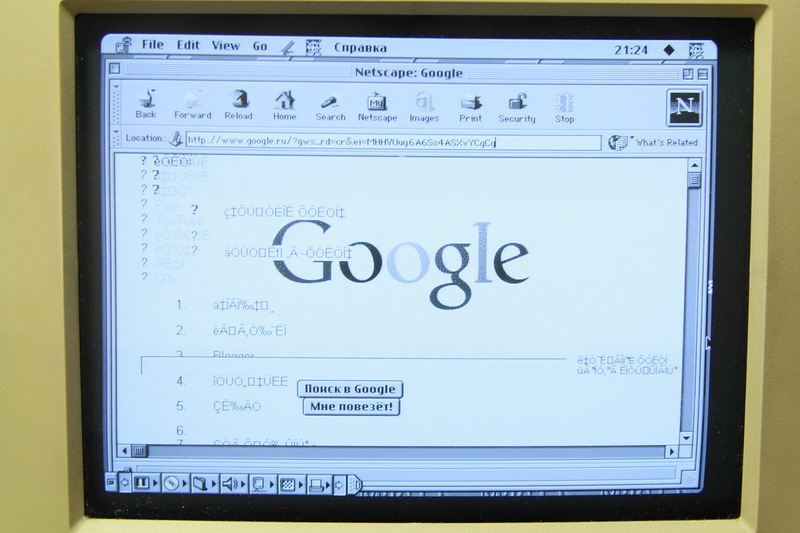
But Google looks disgusting. Problems with the Russian language.
Cyberdog 2.0


Go to the library turned out.
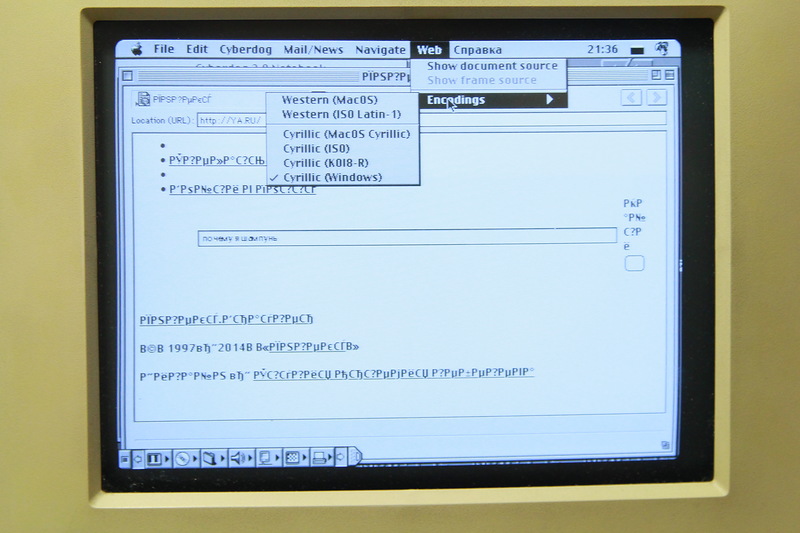
But Yandex, for some reason, did not want to speak Russian.

But Google has opened quite humanly.
iCab 2.9.9
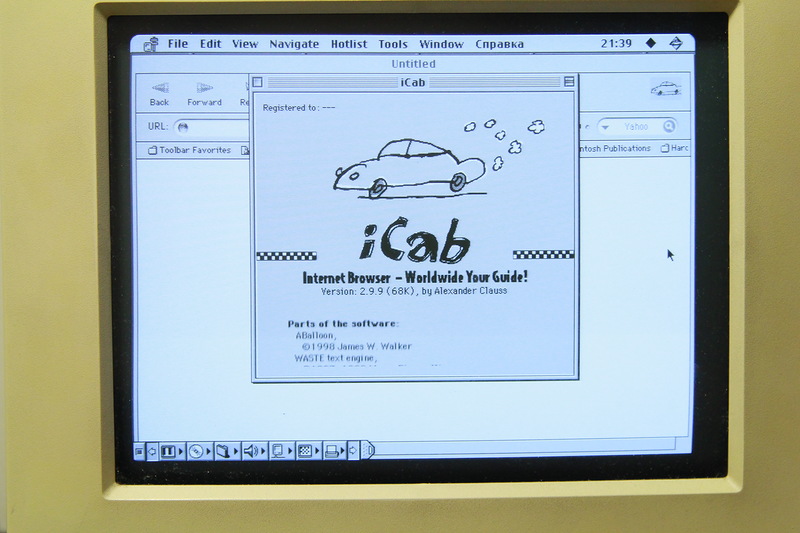

The library of Maxim Moshkov looks quite decent.
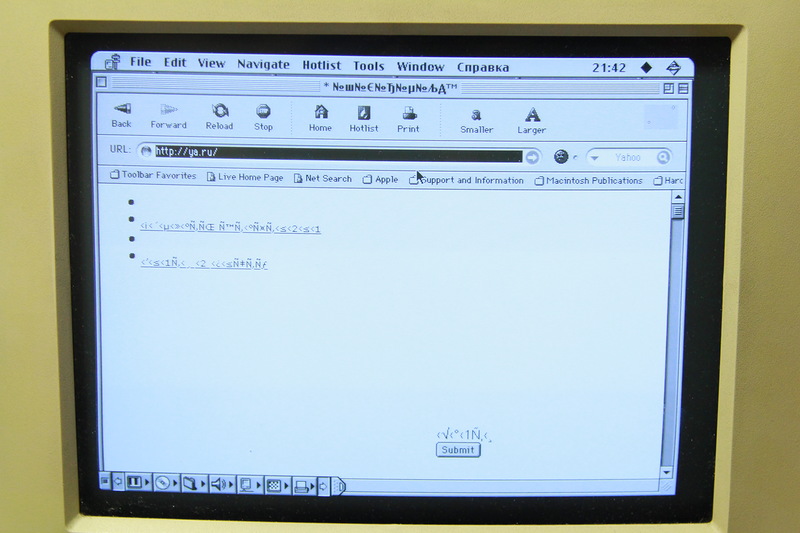
But Yandex itself does not look like.
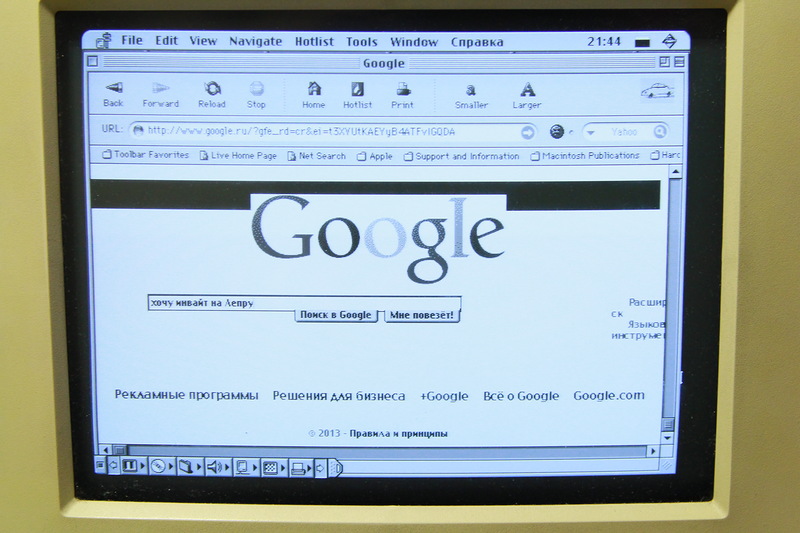
Well, we will use Google.
MacWeb 2.0


If I did not know that this is a problem with the encoding, I would seriously decide that the text is written in Aramaic.
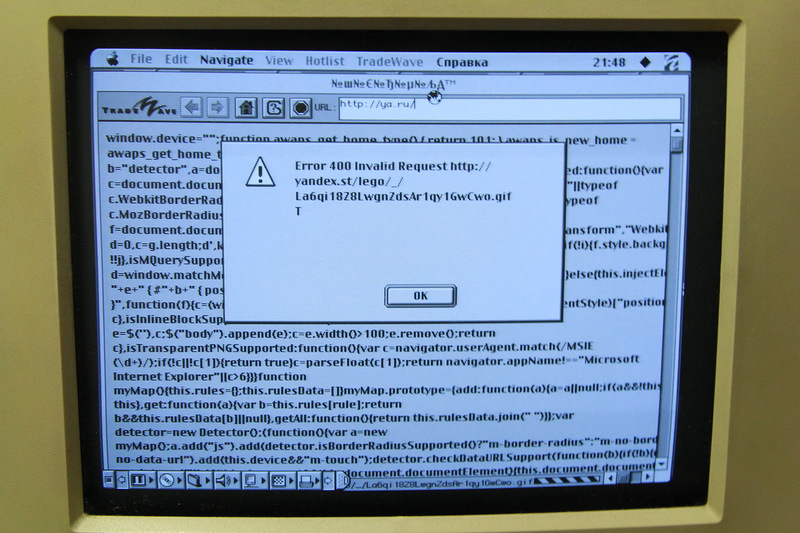
And this is what Yandex looks like. Epic fail.

Google does not look better. After closing the windows with errors, black voids remain on the screen. Handsomely.
Internet Explorer 3.01
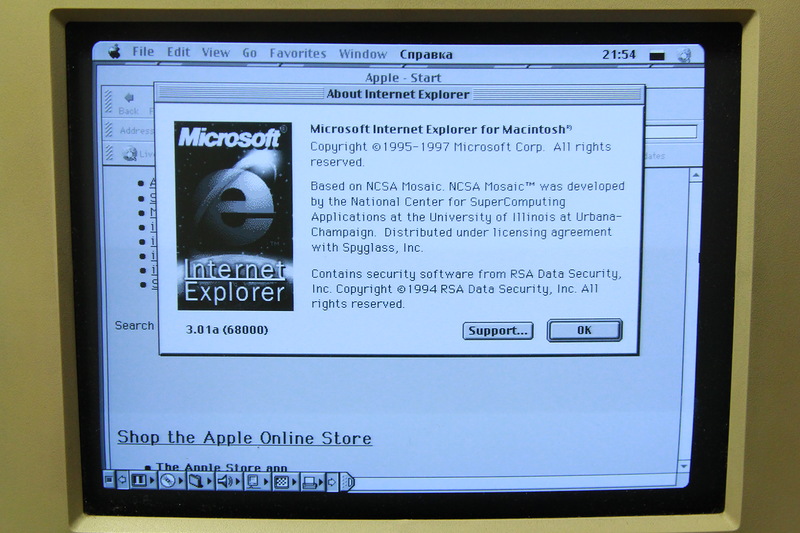
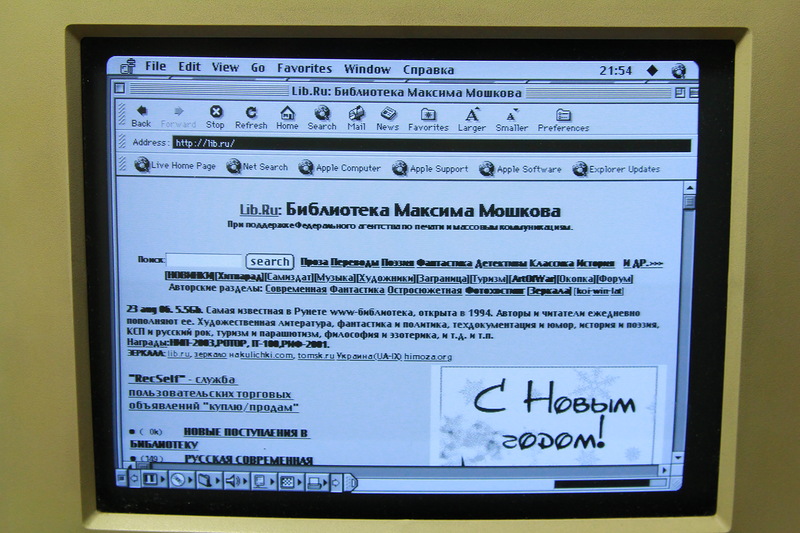
It is not strange, the site has opened. I was expecting a little more ...
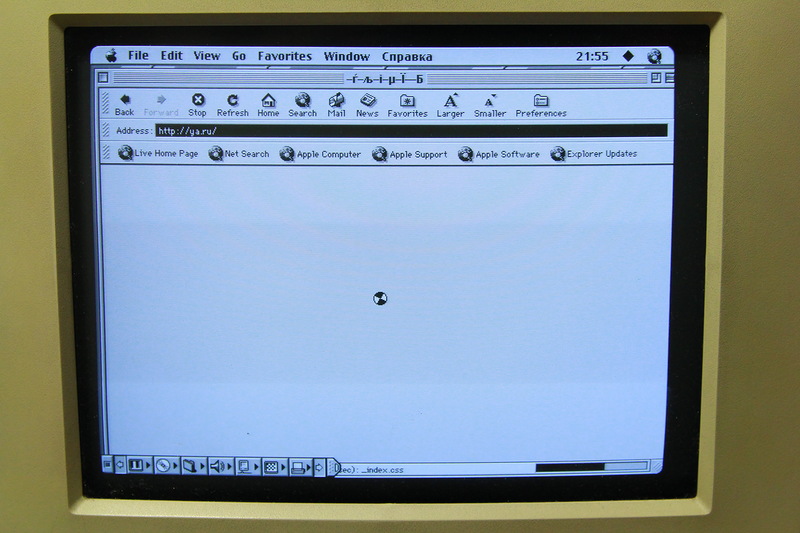
Yandex won. The computer froze.
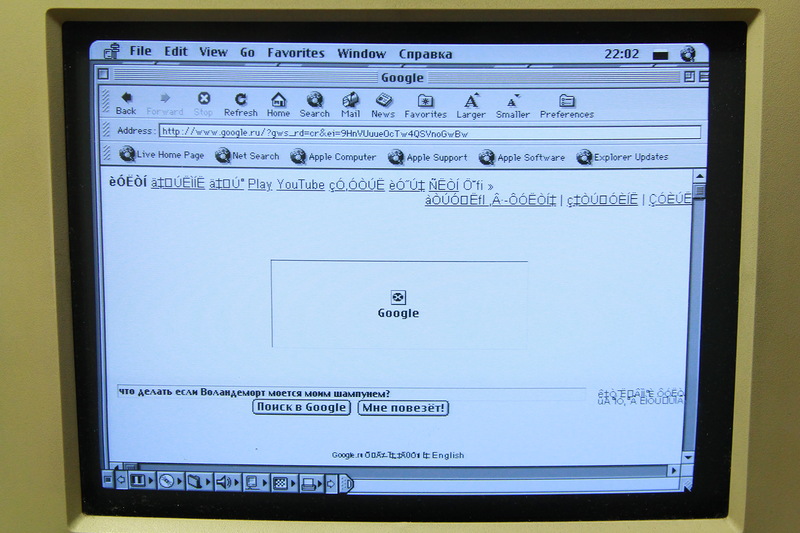
But Google was more appeasable, and it loaded almost correctly. So what if no picture ...
That's all. Thanks to everyone who read the review to the end!

Even the absence of a network card didn’t bother me — there were many ways to connect Macintosh to the world wide web, including through LocalTalk.
')
Connect to the Internet? It's simple!

Well at least nobody mentioned about Dial-Up ... Although, why not?
I hope you have not forgotten what is necessary to access the Internet using a modem? Right! Modem. And still need an Internet provider that provides access to the world wide web via dial-up connection over the telephone line.

The modem was found quite quickly, but with providers providing access to the Internet via dial-up there was a rather interesting situation. Since there is almost no demand for a dial-up Internet connection via a normal (non-ADSL) modem in major cities, I could not find one suitable provider in Moscow and the region.

It is quite possible that I was looking very badly, and such providers exist, however, it is extremely unprofitable to use their services - in addition to paying for access to the Internet, you will also have to pay telephone bills.
Surely everyone remembers that before there was no hourly billing of telephone calls in the city, and many modem owners occupied the telephone line all night. After all, during the day, households could expect an important call to their home phone (not everyone had mobile phones, especially grandparents), and Internet access in the dark (it seems ROL from 2:00 to 7:00) cost much cheaper.
With the introduction of time-based pricing of telephone calls, the modem Internet began to hit the pocket twice - it was necessary to pay not only access itself, but also telephone bills for hours-long telephone “conversations”.
Yourself provider.
As you know, there must always be at least one way out of any situation. So in our case, you can opt out of the services of outside organizations and play the provider yourself. We just need to raise and configure the Dial-In server (inbound server), and the easiest way to do this is in the Windows operating systems.

To establish a modem connection and provide access to the Internet, you can use the built-in tools of the Windows operating system (starting with Win2K and higher) using the wizard to create a new connection on the server computer. Working with the wizard is simple and straightforward, however, just in case, I’ll give a small instruction in pictures, applicable for Windows XP.
Incoming connections in Windows XP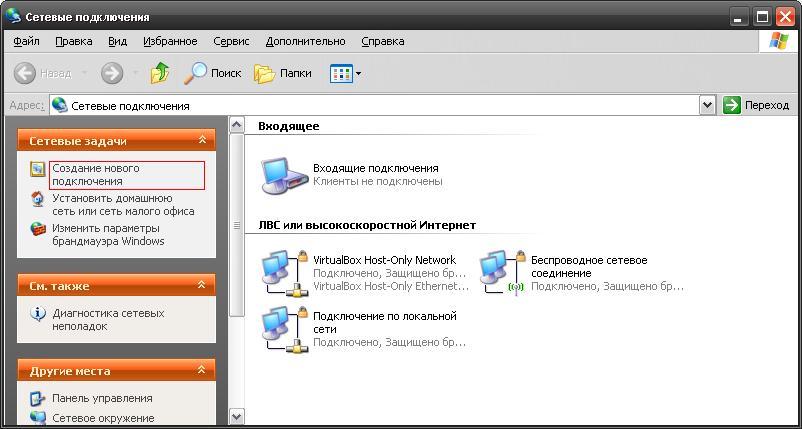

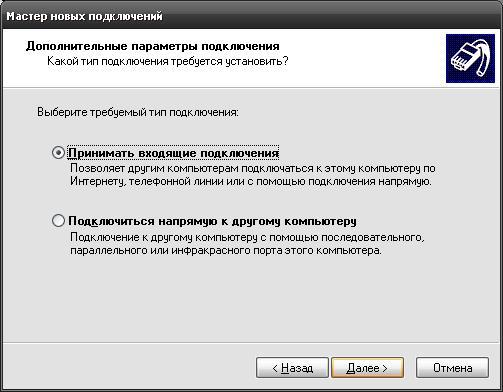
Specify which modem we will use to establish the connection.
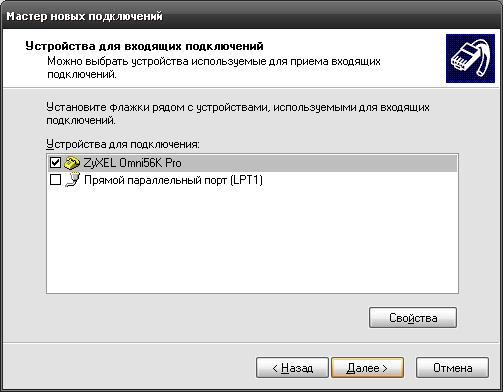
We do not need virtual private connections, we prohibit it.

We tick the user, under which the authorization will take place during connection establishment. The user account must be valid (not disabled) and have a password.
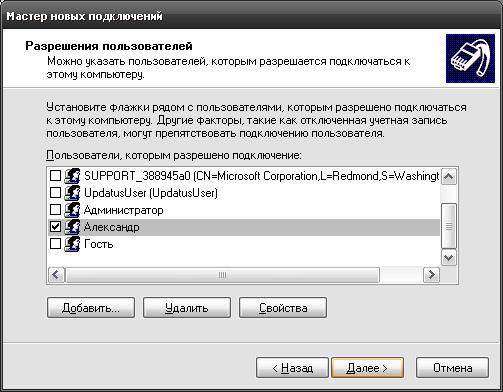

Setting up the incoming server is completed!



Specify which modem we will use to establish the connection.

We do not need virtual private connections, we prohibit it.

We tick the user, under which the authorization will take place during connection establishment. The user account must be valid (not disabled) and have a password.


Setting up the incoming server is completed!
It should be noted that the use of telephone modems implies the existence of a telephone line with all the ensuing consequences. For example, it is desirable to have a PBX to establish communication between two modems. It is desirable, but not necessary. There are several ways to do without it:
- The first way is to connect the Macintosh Performa 475 with a null modem cable to a computer that has Internet access. No modems at all.
- The second way is to find modems that can work on a dedicated line and use them to connect to a computer with Internet access.
- The third way is to establish a connection using two normal modems without using PBX . Requires soldering skills. The most interesting way.

Null modem connection.
I didn’t like the simplicity of using a null modem cable. In addition, you can inadvertently burn the COM port and / or the computer itself, because the null-modem connection does not have a galvanic isolation - if you have an old Soviet electrical wiring without grounding, a sudden might happen.

Modem connection on a dedicated line.
Using a dedicated line is the second easiest way to establish a dial-up modem connection without PBX. Unfortunately, home modems do not know how to work on a dedicated line. This prerogative is only expensive professional modems, which I, alas, did not have.
Quite a good option is to use ordinary modems for connection, "emulating" the presence of PBX. I would choose this method if I had absolutely accidentally missed the NEC (Nitsuko) 2464 TX office PBX, which I will use in my experiments.
Macintosh and COM ports.
Another surprise awaits us when connecting a modem to the Apple Macintosh Performa 475, the serial port of which is designed in the form of a MiniDIN-8 connector . To connect the modem, we need an adapter, the scheme of which is given below.

The main difficulty in the manufacture of the adapter lies in the search for the Mini-DIN-8 (Male) connector. In the store of radio parts, known for its high prices, the name of which I will not voice, it is proposed to buy these connectors for 140 rubles.

The result should be something like this.
Modem selection.
MacOS 8.1 supports some models of modems out of the box, but you can only find these modems in the museum. The only exception is probably the US Robotics modems, which can still be found on the entresol of our vast country.

If you have a modem from this manufacturer, you can select the appropriate driver from the list of supported modems.
Unfortunately, after I got three Zyxel Omni 56K modems (PRO, Plus and PCI Plus), all the other modems I had safely went to landfill, including the external Shprotster at 33.6K.

If there is no model in the list of supported modems, you can search for drivers on the manufacturer's website. However, even if drivers for MacOS existed under your modem (which is not a fact at all), it will not be easy to download them - often links to drivers for outdated products turn out to be dead. Be patient and may the force be with you.

For external Zyxel Omni 56K modems, drivers for MacOS 8.1 - 8.5 can be downloaded from here .
If the modem manufacturer has not bothered to support MacOS 8.1 for its offspring, you can use the Apple Modem Script Generator utility, or search for ready-made modem scripts on the Internet.
Spacewalk.
It's time to surf the web.
Once again I remind you that the Apple Macintosh Performa 475 features are quite modest and are not very suitable for modern Web 2.0 : the processor clock frequency is only 25 MHz, and it was possible to scrape a little RAM - just 36 MB. For a computer of 1994-1996, these are quite decent characteristics, but you yourself understand ...
Netscape Navigator 4.08


The library of Maxim Moshkov opens quite well. Without fascinating reading will not stay.

Yandex, though crooked, but opens.

But Google looks disgusting. Problems with the Russian language.
Cyberdog 2.0


Go to the library turned out.

But Yandex, for some reason, did not want to speak Russian.

But Google has opened quite humanly.
iCab 2.9.9


The library of Maxim Moshkov looks quite decent.

But Yandex itself does not look like.

Well, we will use Google.
MacWeb 2.0


If I did not know that this is a problem with the encoding, I would seriously decide that the text is written in Aramaic.

And this is what Yandex looks like. Epic fail.

Google does not look better. After closing the windows with errors, black voids remain on the screen. Handsomely.
Internet Explorer 3.01


It is not strange, the site has opened. I was expecting a little more ...

Yandex won. The computer froze.

But Google was more appeasable, and it loaded almost correctly. So what if no picture ...
That's all. Thanks to everyone who read the review to the end!
Source: https://habr.com/ru/post/198518/
All Articles